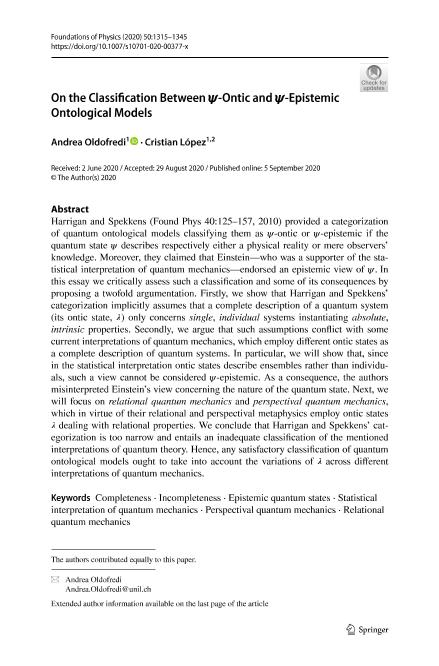Mostrar el registro sencillo del ítem
dc.contributor.author
Oldofredi, Andrea
dc.contributor.author
López, Cristian Ariel

dc.date.available
2023-08-10T11:26:34Z
dc.date.issued
2020-11
dc.identifier.citation
Oldofredi, Andrea; López, Cristian Ariel; On the Classification Between ψ -Ontic and ψ -Epistemic Ontological Models; Springer; Foundations of Physics; 50; 11; 11-2020; 1315-1345
dc.identifier.issn
0015-9018
dc.identifier.uri
http://hdl.handle.net/11336/207719
dc.description.abstract
Harrigan and Spekkens (Found Phys 40:125–157, 2010) provided a categorization of quantum ontological models classifying them as ψ-ontic or ψ-epistemic if the quantum state ψ describes respectively either a physical reality or mere observers’ knowledge. Moreover, they claimed that Einstein—who was a supporter of the statistical interpretation of quantum mechanics—endorsed an epistemic view of ψ. In this essay we critically assess such a classification and some of its consequences by proposing a twofold argumentation. Firstly, we show that Harrigan and Spekkens’ categorization implicitly assumes that a complete description of a quantum system (its ontic state, λ) only concerns single, individual systems instantiating absolute, intrinsic properties. Secondly, we argue that such assumptions conflict with some current interpretations of quantum mechanics, which employ different ontic states as a complete description of quantum systems. In particular, we will show that, since in the statistical interpretation ontic states describe ensembles rather than individuals, such a view cannot be considered ψ-epistemic. As a consequence, the authors misinterpreted Einstein’s view concerning the nature of the quantum state. Next, we will focus on relational quantum mechanics and perspectival quantum mechanics, which in virtue of their relational and perspectival metaphysics employ ontic states λ dealing with relational properties. We conclude that Harrigan and Spekkens’ categorization is too narrow and entails an inadequate classification of the mentioned interpretations of quantum theory. Hence, any satisfactory classification of quantum ontological models ought to take into account the variations of λ across different interpretations of quantum mechanics.
dc.format
application/pdf
dc.language.iso
eng
dc.publisher
Springer

dc.rights
info:eu-repo/semantics/openAccess
dc.rights.uri
https://creativecommons.org/licenses/by/2.5/ar/
dc.subject
COMPLETENESS
dc.subject
EPISTEMIC QUANTUM STATES
dc.subject
INCOMPLETENESS
dc.subject
PERSPECTIVAL QUANTUM MECHANICS
dc.subject
RELATIONAL QUANTUM MECHANICS
dc.subject
STATISTICAL INTERPRETATION OF QUANTUM MECHANICS
dc.subject.classification
Filosofía, Historia y Filosofía de la Ciencia y la Tecnología

dc.subject.classification
Filosofía, Ética y Religión

dc.subject.classification
HUMANIDADES

dc.title
On the Classification Between ψ -Ontic and ψ -Epistemic Ontological Models
dc.type
info:eu-repo/semantics/article
dc.type
info:ar-repo/semantics/artículo
dc.type
info:eu-repo/semantics/publishedVersion
dc.date.updated
2023-08-09T12:54:37Z
dc.journal.volume
50
dc.journal.number
11
dc.journal.pagination
1315-1345
dc.journal.pais
Alemania

dc.description.fil
Fil: Oldofredi, Andrea. Universite de Lausanne; Suiza
dc.description.fil
Fil: López, Cristian Ariel. Universidad de Buenos Aires; Argentina. Universite de Lausanne; Suiza. Consejo Nacional de Investigaciones Científicas y Técnicas; Argentina
dc.journal.title
Foundations of Physics

dc.relation.alternativeid
info:eu-repo/semantics/altIdentifier/doi/http://dx.doi.org/10.1007/s10701-020-00377-x
Archivos asociados
